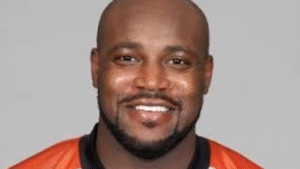Advertisements
The world of football was rocked on September 23, 2025, when news broke of the untimely death of Rudi Johnson, the former NFL running back. Johnson, just 45 years old, passed away in his home state of Florida, and the cause of death has since been confirmed as suicide. This tragic loss has left many grieving, not just because of his prowess on the field but also because of the struggles he faced that were hidden from public view.
A Star on the Field, but a Silent Struggle Off It
Rudi Johnson made his mark in the NFL with the Cincinnati Bengals, where he became known for his explosive running and determination. He earned a Pro Bowl selection in 2004 and set the Bengals’ record for most rushing yards in a season in 2005. But his career, while filled with achievements, was not without its challenges.
Advertisements
His struggles off the field, especially with mental health, have come to light in the wake of his death. Reports indicate that Johnson had battled with depression and was suspected to have suffered from CTE (chronic traumatic encephalopathy), a condition common among athletes who have endured repeated head injuries. CTE can lead to mood disorders, memory loss, and, tragically, suicidal tendencies. These factors may have played a significant role in Johnson’s untimely passing.
A Message of Hope, Cut Short
Just days before his death, Johnson gave a heartfelt speech at the Chesterfield Sports Hall of Fame’s Class of 2025 induction ceremony. Though he wasn’t able to attend in person, he sent a video message urging the youth to “never give up” and to “shoot for the stars.” It was a beautiful moment; one filled with optimism and encouragement. He shared his dreams for the next generation, encouraging kids from Chesterfield County to stay focused and reach for their goals.
“I just want to say, dream big,” Johnson said in the video. “Shoot for the stars. Stay focused. Never give up.” His words were filled with warmth and hope, a stark contrast to the sorrowful events that unfolded just days later.
The Weight of Mental Health in Sports
Rudi Johnson’s death highlights an often-overlooked aspect of professional sports: the mental health struggles that athletes face both during and after their careers. While physical injuries are easily visible and treated, mental health challenges often go unaddressed. The intense pressure to perform, the physical toll of the game, and the loss of identity after retirement can lead to serious psychological issues.
In recent years, the conversation around athletes’ mental health has grown, but Johnson’s death serves as a painful reminder of how far there is still to go. Many athletes face a silent battle, and unfortunately, the pressure can become overwhelming.

CTE and Mental Health: A Growing Concern in Sports
Johnson’s tragic passing brings to the forefront the growing concerns surrounding CTE and its effects on former athletes. CTE, which is linked to repeated head injuries, has been identified in several NFL players posthumously. The symptoms, which can include depression, anxiety, and mood swings, are devastating. For Johnson, the mental health challenges were compounded by the possibility of CTE, a condition that has taken the lives of too many athletes in recent years.
The NFL has taken steps in recent years to address the issue of head injuries, but it’s clear that more must be done. More comprehensive mental health support, as well as continued research into the long-term effects of concussions and CTE, is essential for the well-being of current and former players.
A Legacy Remembered
Rudi Johnson’s legacy in football is undeniable. He remains one of the most respected players in Bengals history, ranking as one of the franchise’s all-time rushing leaders. His records, including his 1,458 rushing yards in 2005, still stand as a testament to his skill and determination. But beyond the statistics, Johnson was known as a tough, hardworking player, someone who gave everything to the game.
However, his legacy will now also serve as a call to action. His death has sparked conversations about the importance of mental health care for athletes, particularly those in high-impact sports like football. His family, friends, and former teammates are mourning the loss of a man who brought so much to the field but struggled in silence.
The Road Ahead: A Lesson in Compassion and Action
As the sports community mourns the loss of Rudi Johnson, it’s crucial to reflect on how we support athletes, both on and off the field. The mental health of athletes must become a priority, and more resources must be allocated to help them cope with the pressures of the sport.
In the wake of Johnson’s death, there is hope that his story will inspire change. The NFL, teams, and the broader sports world must do more to ensure that the mental health of athletes is given the attention it deserves. No one should have to suffer in silence, and no player’s legacy should end with such a tragic event.
Rudi Johnson’s life and career were a testament to his skill and heart. His death, though heartbreaking, serves as an opportunity to address the critical issue of mental health in sports and ensure that future generations of athletes receive the support they need to thrive both on and off the field.
Advertisements